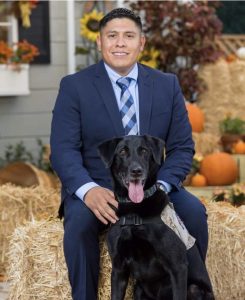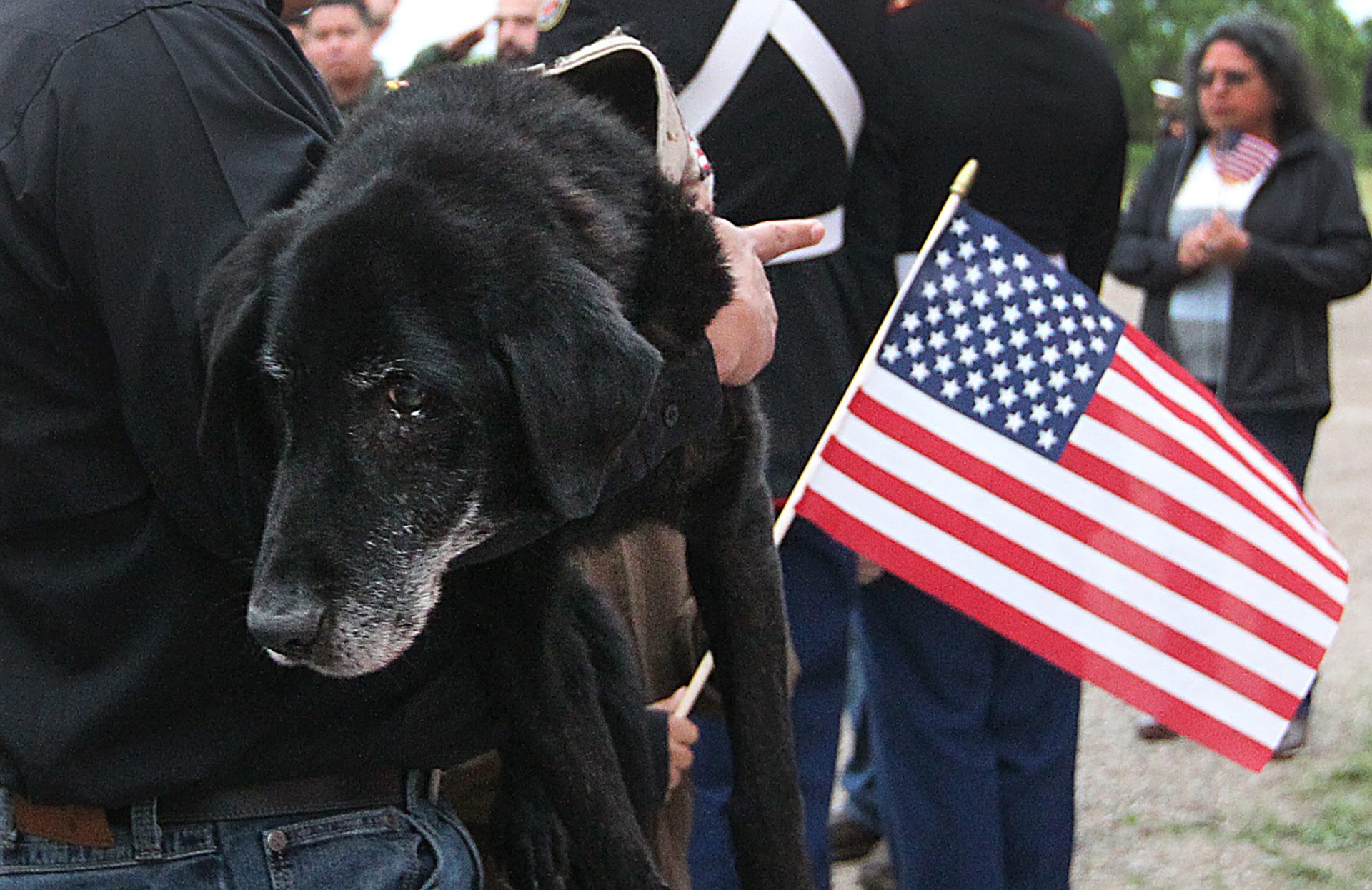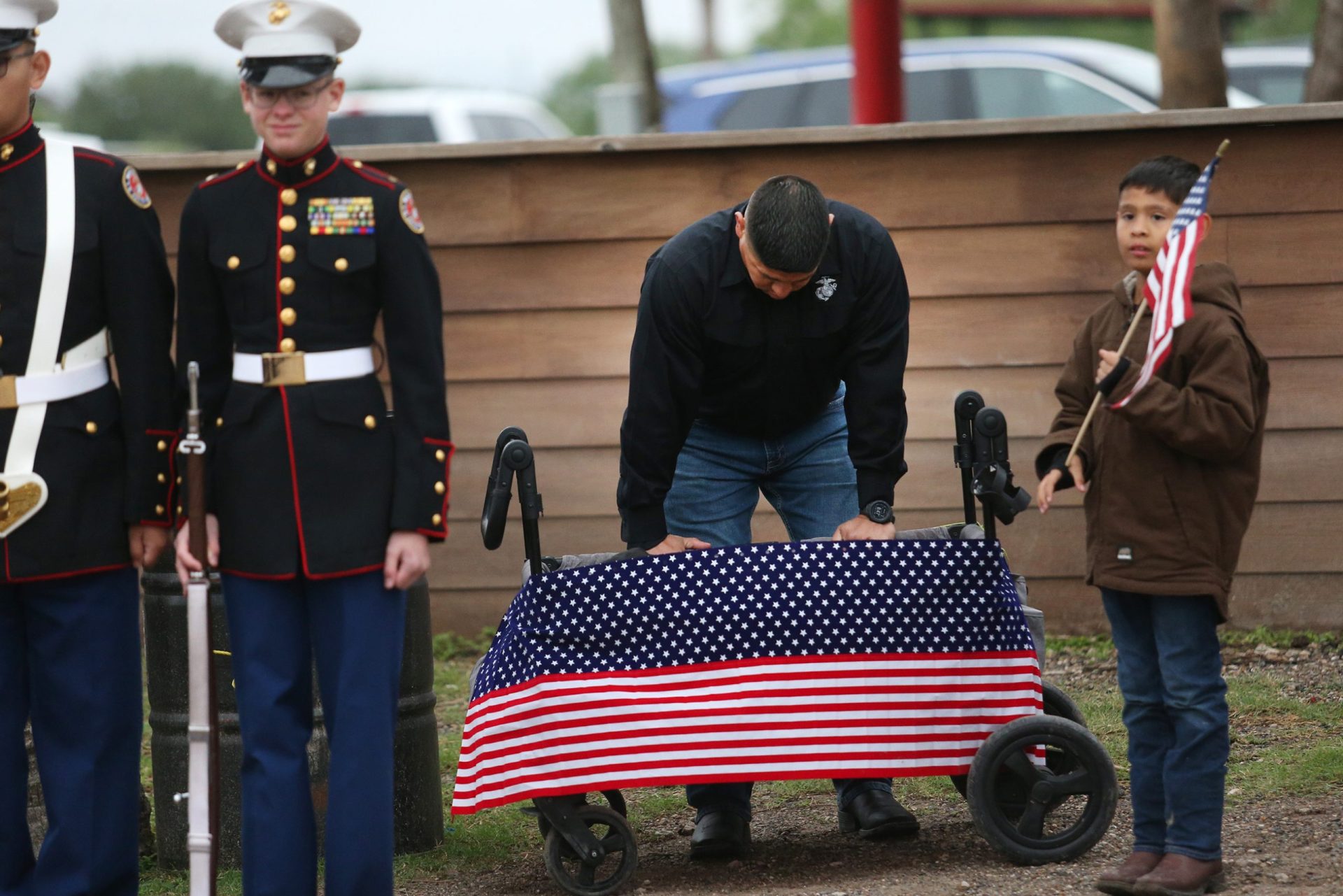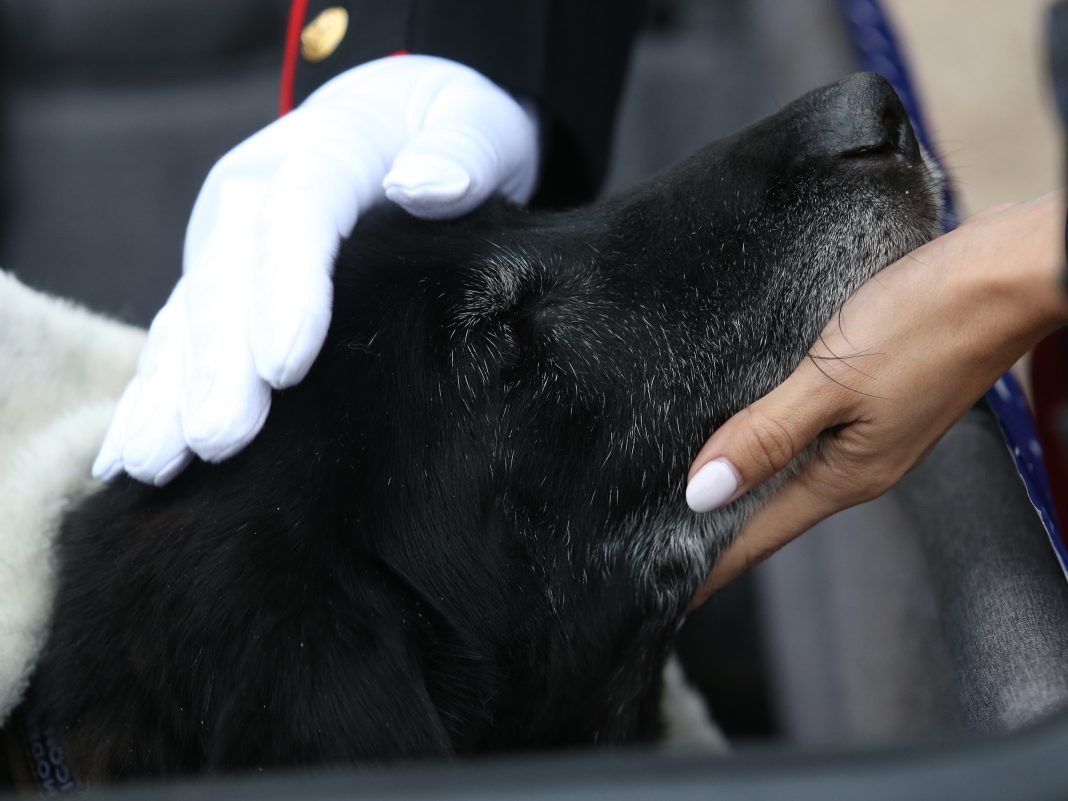
EDINBURG — “Thank you for bringing my son home,” Oralia Alvarado said, leaning down to wrap her arms around the neck of a big black labrador retriever lying in a blanketed wagon on the outskirts of town Thursday.
Alvarado pulled herself away quickly, letting go of the dog in a rush like you’d rip off a bandaid. He’d be dead within the hour.
Saying farewell to Sgt. Fieldy was obviously emotional for Alvarado. It was particularly emotional for her son, Nick Caceres, a Marine veteran who served as Fieldy’s handler on one of the dog’s three tours in Afghanistan. Caceres has, over the past few months, made Fieldy the namesake of a push to change rules at veteran cemeteries that would allow military working dogs to be buried there.
Fieldy — 15 years old and in poor health — was euthanized Thursday. He received most of the traditional pomp and circumstance that attend funerals of two-legged veterans: a rendition of taps, a gun salute, a flag draped over his body.
Fieldy will not, however, lie in peace next to other veterans at the Rio Grande Valley State Veterans Cemetery in Mission.
Caceres says Fieldy — and other military dogs — deserve that honor as well. “They were there with us, every step of the way,” he said. “Every day that I was there, he was there.”
The two met in 2011, after Caceres’ selection to be a handler. The attraction was almost instantaneous.
“He was all gas,” Caceres said. “He was 100 miles an hour.”
In Afghanistan, Fieldy was a tether to home for Caceres and other soldiers, wagging his tail and catching balls and doing regular dog things.
“Other Marines felt normal,” Caceres said. “They would stop me: ‘Can I pet your dog?’ And they would be normal, you’d forget where you’re at for those two minutes.”
Fieldy was also very much part of the war effort. They swept and secured regularly, Caceres relying on Fieldy’s nose to keep him safe. On a couple of occasions they found fragments of explosive devices, aiding in investigations into those explosions.

Once, Fieldy was in a convoy hit with an improvised explosive device that went off and hurt Marines.
Fieldy found a second bomb that hadn’t gone off yet, allowing the rest of the convoy to pass safely and clearing a landing zone for injured soldiers’ medivac.
At the end of Caceres’ tour, the two were separated. Caceres immediately filled out the paperwork to adopt Fieldy when his retirement came around.
The dog would remain on his mind for the next couple of years.
“I kept calling, calling the number of where the headquarters was that was in charge of him,” Caceres said. “I would call them every few months — two, three months — just to check up on him.”
One day, about nine years ago, the waiting paid off. Caceres got a phone call from Virginia: Fieldy was up for adoption, and at long last, the two were reunited. Caceres and his wife had established a growing family; Fieldy quickly became part of it.
“When we would put our son in the bassinet, he would lay down with him,” he said. “It went from him following me around to following the baby around. Family or friends would come over and see the baby; they’d carry the baby and he would follow them around.”
Fieldy on Thursday was a long way removed from the spry lab who went off to war a decade ago. The big hound’s eyes drooped. His muzzle had gone white. His back legs dragged whenever he clambered up to walk.
Caceres’ mother was one of dozens who made the trip out to a property owned by one of his friends, many of them veterans or supporters of veterans.

Most walked up to Fieldy’s little wagon to say their goodbyes. Fieldy seemed to appreciate all of the head scratches.
Finally, Caceres and his family walked between a double column of people holding flags, wheeling Fieldy along with him.
They went in a barn, where Fieldy was humanely euthanized. Later they reemerged, Fieldy’s body under a bag on a gurney. Caceres and his son stood ramrod straight, looking on while a flag was draped over Fieldy. Casares’ wife and daughter couldn’t quite hold back tears. For all the military trappings, Thursday’s ceremony also was simply a family saying goodbye to a beloved pet.
Family, legacy and remembrance are a big part of what’s driven Caceres’ advocacy for burying Fieldy in the veterans cemetery.
“My kids grow up, and they have kids, they can drive down here and say ‘This is your grandpa’s dog, and he went to war.’” he said. “Because he went to war. I mean, it’s not a figurative thing. It’s literal. We went to war together.”
Caceres planned on having Fieldy cremated and retaining his remains in the hope of interring them at the cemetery one day.
He’s made progress toward making that goal a reality. Last month U.S. Rep. Vicente Gonzalez — who was present Thursday — announced that he introduced the Sgt. Fieldy Act, which would allow military working dogs to be buried in national and some state veteran cemeteries.
“Every Marine goes home, to wherever home is. Whatever state, whatever town that they’re in,” he said.
For Caceres and Fieldy, home is near each other.
To see more, view Monitor photojournalist Delcia Lopez’s full photo gallery here:
RELATED READING:
House bill would allow military dogs to be buried at national cemeteries





